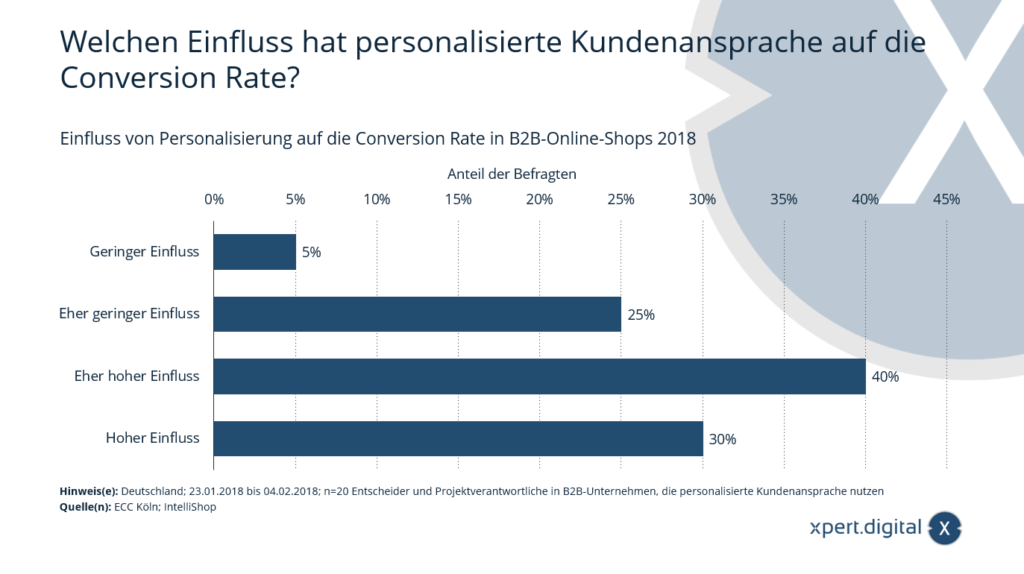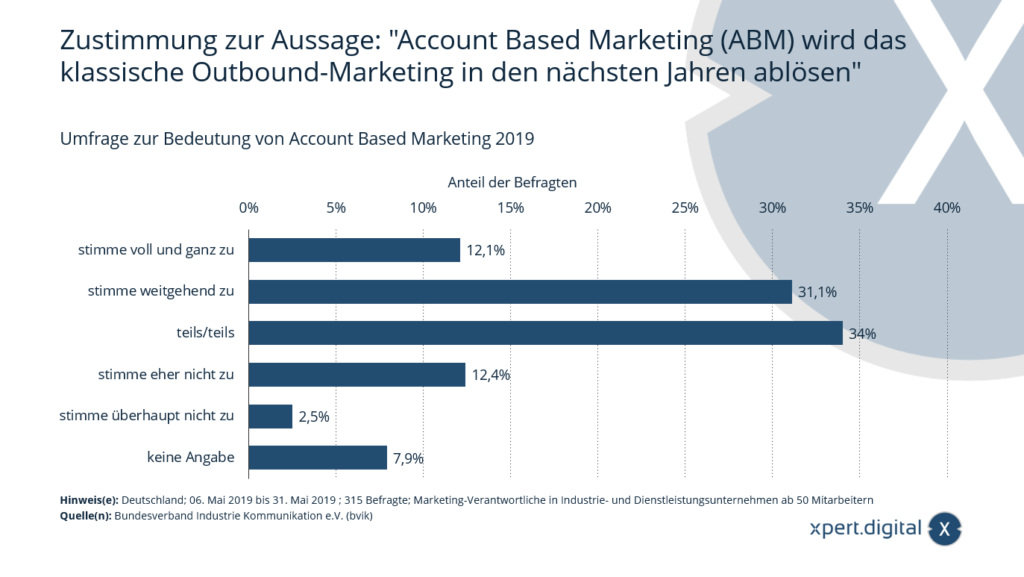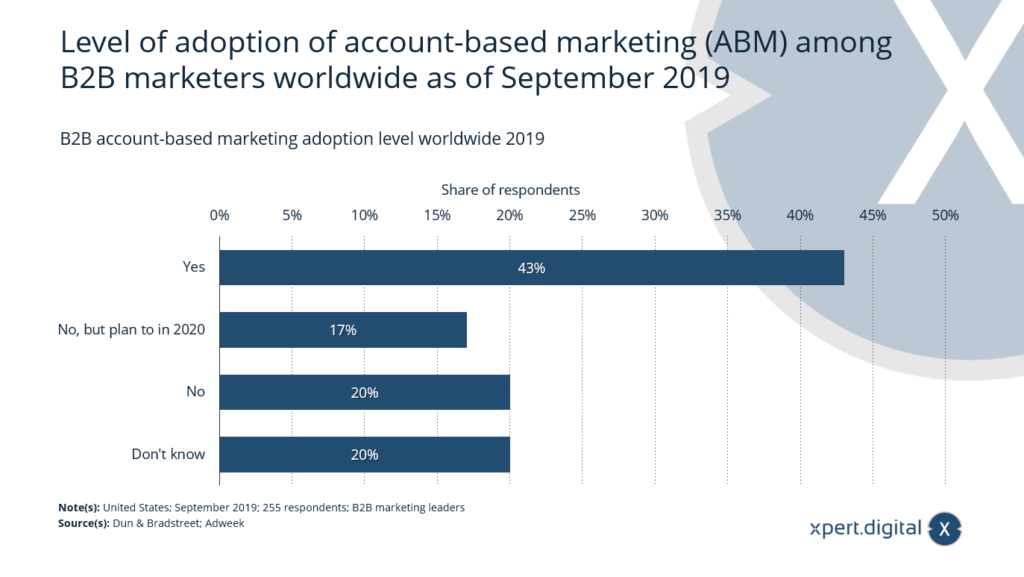Looking for a digital marketing agency from Esslingen, Göppingen or Geislingen?
Language selection 📢
Published on: June 3, 2021 / update from: June 12, 2021 - Author: Konrad Wolfenstein

Online marketing agency for Esslingen, Göppingen or Geislingen – Image: wavebreakmedia|Shutterstock.com
Personalized customer approach
According to a survey, personalized customer approach has a high influence of 30% and a rather high influence of 40% on the conversion rate in B2B. The higher the conversion rate, the greater the brand awareness and brand identity. But it is also a sign that you know your target group, provide them with the right content and understand them, and in return they are grateful for it and give us their attention.
This statistic shows the results of a survey on the influence of personalized customer approach on the conversion rate in B2B online shops in Germany. At the time of the 2018 survey, 40 percent of those surveyed stated that personalized customer contact has a rather high influence on the conversion rate.
- 5% – Low impact
- 25% – Fairly low impact
- 40% – Rather high influence
- 30% – High influence
Marketing personalization
Personalization was named the 2019 Marketing Word of the Year by the Association of National Advertisers (ANA). This decision proved to be well-founded as personalization has become one of the most indispensable marketing strategies among industry experts, especially in the United States. Marketing personalization, or the practice of using personal data to initiate targeted advertising, has been rapidly adopted by brands and companies across various industries in recent years. While the proportion of marketing budgets devoted to personalization can vary, a recent survey showed that 33 percent of marketers in the United States and the United Kingdom (UK) spend more than half of their online marketing dollars on personalization efforts. This share is likely to increase in the future as advances in technology, data and analytics enable marketers to personalize customer experiences across more channels and customer journey stages than ever before.
Marketer perspective: Personalization is key
Marketers are using personalization tactics in their digital marketing campaigns more than ever. According to a recent survey, the percentage of professionals using marketing personalization in the U.S. ranges from 78 to 96 percent depending on the industry, showing how valuable personalization has become in today's competitive marketing landscape. In 2020, email was the most used digital channel for personalized communications among US marketers, which is not surprising considering that messages delivered through this medium are highly customizable, easily consumable and non-invasive. The email format allows marketers to address (potential) customers by name, personalize the subject lines and adapt the email text to their target groups. Other popular techniques include tailoring product recommendations based on a customer's search and purchase history, a strategy long used by e-commerce giants.
When asked about the top benefits of marketing personalization in 2020, industry experts cited improving customer experience, conversion rates, and visitor engagement.
Consumers value personalized experiences more than quantitative content
Personalization is becoming not only a competitive advantage, but also something that customers have come to value and expect. A 2019 personalized marketing survey found that 90 percent of U.S. consumers surveyed find company messages that are not personally relevant disruptive. A 2020 survey on the frequency of using personalized recommendations confirmed these results, finding that over 65 percent of internet users in the US and UK shop with product recommendations at least occasionally. In today's highly competitive e-commerce market, purchasing decisions are visibly influenced by how relevant the content is. In order to receive the most valuable suggestions and a personalized online experience, many Internet users are willing to share email addresses or other personal information with companies. This data flow and use for personalization purposes is likely to accelerate in the future as marketing technology based on machine learning and artificial intelligence, for example, continues to evolve.
Account Based Marketing is a go-to-market strategy that coordinates personalized marketing and sales efforts to acquire and grow target customers.
Account Based Marketing (ABM)
ABM originally emerged from key account marketing in the USA in the mid-2010s. Account based marketing has been actively used in Germany since around 2014, but is still not very widespread. Account Based Marketing refers to a strategic form of B2B marketing. Relevant corporate customers are viewed as so-called “target accounts”. These are identified, qualified and addressed in a personalized manner. Account based marketing is usually used in marketing and sales departments to attract large and medium-sized companies as customers.
Account based marketing makes sense for companies that
- want to address a few, high-quality B2B customers in a highly individualized manner.
- have a sharp, clearly defined target group.
- offer high-priced niche products or services.
- Want to deepen existing customer relationships in the long term through upselling, cross-selling and reselling.
- want to convince not just one decision-maker, but an entire decision-making committee (so-called buying center) of the same business deal.
- Want to optimally coordinate marketing and sales activities.
- want to identify relevant new customers (so-called leads) early and clearly.
- want to carry out automated B2B marketing in a targeted manner.
Important instruments and topics in German account based marketing
Identification of target accounts:
- Website user recognition
- Intent signals
Qualification of leads:
- Company data (firmographics/firmographic data)
- Technical data (Technographics/technographic data)
Addressing and converting:
- Account-based advertising
- Geotargeting from Google Ads
- personalized postal mailing
Initially, the term “flip-the-funnel” emerged in account-based marketing: While in the “classic marketing funnel” many interested parties are addressed, only a few of whom actually become customers, with ABM it works the other way around.
A new funnel term has now been created for account based marketing: the ABM funnel is represented as a double funnel in the shape of an hourglass. Many potential target customers are initially identified. These are then filtered in a qualification phase. In the third step, a larger group of people is addressed again with entire “buying centers”.
In Europe, data protection and – in Germany – the General Data Protection Regulation (GDPR) place special requirements on account-based marketing. In order for ABM to be data protection and GDPR compliant, a strict distinction is made between personal and company-related data. This separation is currently supported by a few, mainly European, ABM platforms.
Approval for the statement: "Account Based Marketing (ABM) will replace classic outbound marketing in the next few years"
In May 2019, almost 12.1 percent of the B2B marketers of German industrial and service companies in the statement “Account Based Marketing (ABM) will be fully replaced by the classic outbound marketing in the next few years”. Another 31.1 percent of those surveyed largely agreed with the statement. 315 marketing managers were interviewed in industrial and service companies from 50 employees.
- 12.1% – Strongly agree
- 31.1% – Broadly agree
- 34% – Part/part
- 12.4% – Rather disagree
- 2.5% – Strongly disagree
- 7.9% – No information
Level of adoption of account-based marketing (ABM) among B2B marketers worldwide
A September 2019 survey of B2B marketers worldwide found that 43 percent of respondents said they already use account based marketing (ABM) as part of their strategy. ABM is based on a focused and shared approach to specific customer accounts by marketing and sales departments, allowing them to see the entire customer journey and personalize the customer experience.
- 43% – Yes
- 17% – No, but planned for 2020
- 20% – No
- 20% – Don’t know
Current PDF libraries to support your marketing planning and activities
We provide you with further numerous insights into numbers, data and facts that can help you optimize and expand your marketing:
- Customer Demographics Library – Demographics Knowledge Base (PDF)
- Online Marketing Library (PDF)
- E-Commerce Library – Knowledge Base (PDF)
- Social Media Marketing Library – Knowledge Base (PDF)
- SEO Library – SEM knowledge database (PDF)
- Search Engine Advertising / SEA Library – Search Engine Advertising Knowledge Base (PDF)
- Extended Reality (XR) Library (PDF)
Do you need more input on marketing?
- Content marketing: supreme discipline with obstacles and the most valuable types of content marketing
- The most effective marketing channels for leads, the most effective tactics, the most effective early stage engagements, and the most effective channels to increase conversions
- Marketing strategies and trends
- Marketing challenges. Are you new to the company or is your marketing no longer running smoothly? To do this, you should ask yourself three questions
More topics on SEO
- Supreme discipline for search engine optimization, search engine marketing: Mobile SEO
- SEO focus: Mobile-ready for local information searches
- Local search optimization: in Google Maps the “Nearby” search
- Search engine advertising – search engine advertising
- How your target group interacts is crucial for SEO, SEA and SEM
- Business Research: Keeping an eye on things
That's why Xpert.Digital for Esslingen, Göppingen and Geislingen!
I would be happy to serve as your personal advisor.
You can contact me by filling out the contact form below or simply call me on +49 731 37 999 300 .
I'm looking forward to our joint project.
Xpert.Digital – Konrad Wolfenstein
Xpert.Digital is a hub for industry with a focus on digitalization, mechanical engineering, logistics/intralogistics and photovoltaics.
With our 360° business development solution, we support well-known companies from new business to after sales.
Market intelligence, smarketing, marketing automation, content development, PR, mail campaigns, personalized social media and lead nurturing are part of our digital tools.
You can find out more at: www.xpert.digital – www.xpert.solar – www.xpert.plus





























